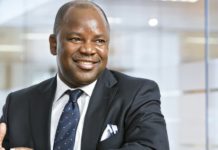
[miningmx.com] — YOU’D expect a mining company CEO to have a passion for rock. Well, fluorspar producer Sallies CEO Tom Dale not only has an interest in geological rock but also in hard rock.
When he was young, British-born Dale was a drummer in a rock band and he once owned more than 20 guitars. And his passion for music hasn’t abated. He’ll be travelling to Denmark in August to show off his vocal chords at a festival.
The mining industry respects Dale as a man who knows how to get things done. Along with his partner in crime, Johann Blersch, Dale has patched up the sinking ship that was Sallies and is steering it in the right direction. “If Sallies doesn’t turn a profit in 2009 I’ll resign,” Dale said in September 2008.
 Sallies has been harder to fix than Gold Fields
Sallies has been harder to fix than Gold Fields
And it seems Sallies won’t be looking for a new CEO anytime soon. The company posted a long-awaited R13m operating profit in its interim results last week, against a loss of nearly R26m a year earlier. It’s been its first profit in six years.
Dale wasn’t slow to get to work. He was appointed chairman in February 2007 and in April he effectively told then CEO Izak Marais to perform or get out. Marais soon left after an acrimonious standoff between the two. Dale took over as CEO in October 2007.
Since then, Dale has overhauled the way Sallies sells its fluorspar after the previous board had been selling below production costs. He hired a new marketing company and revised accounting and mining processes within the company.
But how did Dale decide mining was the path for him? “At university most of the stupid people got into agriculture. I didn’t get in – but I got into mining!” Dale says in fits of laughter.
With a BSc (Hons) degree in mining engineering under his belt, Dale came to South Africa in 1973 and joined JCI as a mine manager. “In my opinion, JCI was the best mining house in those days – technically and financially speaking.” He continued to spend 15 years in management at JCI’s gold and coal mines.
Dale joined Gencor in 1991 after five years as a rated gold analyst. During his years there, former chairman Brian Gilbertson described Dale as his “blunt weapon”. If he needed anything done, Dale was his man.
After a merger of the gold assets of Gengold and GFSA, Dale headed Gold Fields in 1998. He was originally appointed CEO but the nominated CE, Richard Robinson, resigned and Dale became MD. The company was put through its paces in the time Dale was involved.
“But I think Sallies has been harder to fix than Gold Fields. It’s been an enormous challenge so far,” Dale says.
He retired in 1999. “After a year or so I got fed up with retirement.” So Dale took on the role of CEO at Mopani Copper Mines, a company operating in Zambia.
Then Dale and Blersch joined Randgold’s board as independent non-executive directors in 2006. “I thought it would be a challenge to join the company after the Kebble fiasco,” says Dale. However, Dale and Blersch were ousted from the board in 2007 after accusations of being obstructionists. Both said they’d been “totally dissatisfied” with the standard of corporate governance at Randgold.
Blersch then convinced Dale to join Sallies and the rest, as they say, is history. The biggest threat to the company’s survival is a dispute with US-based Honeywell, which could mean a payment of R65m if the decision in the International Chamber of Commerce goes against it.
“We wouldn’t be able to absorb a smack like that,” Dale says, unwilling to comment on what Sallies would do to pay that amount if the decision goes against it.
The future of fluorspar markets is also a factor to watch. Dale says Sallies’ flagship Witkop mine is a medium to high cost operation and it was those kinds of operations that “go to the wall” when prices drop. “Our liquidity is good, so I’m not going to produce fluorspar that either we can’t sell or must sell at a loss, destroying the liquidity we’ve built up over a two-year period,” Dale says. “I’d rather live to fight another day.”











